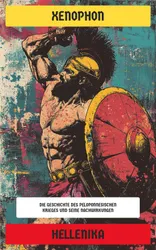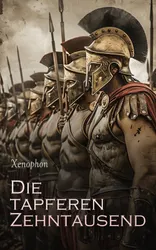In "The History of Xenophon," the ancient Greek historian and soldier crafts a compelling narrative that intertwines personal experience with broader historical themes, notably the complexities of leadership, warfare, and human nature. Written in a direct and engaging prose style, the text reflects both personal observations from Xenophon's campaigns and his philosophical reflections on power dynamics. In a literary context that bridges the gap between narrative history and political philosophy, Xenophon employs a distinctive approach that examines the consequences of decisions made in the heat of battle and the virtues of effective governance, influenced by his time among the Greek mercenaries known as the Ten Thousand. Xenophon, a contemporary of Plato and student of Socrates, brings a unique perspective shaped by his experiences as a soldier and a politician in the turbulent landscape of 4th-century BCE Greece. His insights into the moral and ethical dilemmas faced by leaders are informed by his diverse roles, which include historian, philosopher, and military commander. This multifaceted background imbues his writing with a richness and authenticity that resonate throughout his historical inquiries. Readers interested in the intersection of history and philosophy will find "The History of Xenophon" an invaluable addition to their library. This work not only provides a vivid account of historical events but also prompts thoughtful reflection on the attributes that define effective leadership. Xenophon's blend of narrative skill and keen observation makes this text a timeless exploration of human ambition and the lessons learned through conflict.

Die Geschichte des Peloponnesischen Kriegs (Komplette Ausgabe: Buch 1&2) : Die Geschichte von Thukydides: 431-411 v.Chr. + Fortsetzung von Xenophon: 411-362
Thukydides, Xenophon
book
Hellenika : Die Geschichte des Peloponnesischen Krieges und seine Nachwirkungen
Xenophon
book
Die tapferen Zehntausend
Xenophon
book
50 Meisterwerke der Philosophie : Metaphysik, Das Gastmahl, Bhagavadgita, Tractatus logico-philosophicus, Kritik der reinen Vernunft, Also sprach Zarathustra, Selbstbetrachtungen von Marcus Aurelius
Ludwig Wittgenstein, Edmund Husserl, Karl Marx, Søren Kierkegaard, Friedrich Nietzsche, Ralph Waldo Emerson, John Stuart Mill, Georg Wilhelm Friedrich Hegel, Friedrich Schelling, Johann Gottlieb Fichte, Immanuel Kant, John Locke, Montesquieu, Jean Jacques Rousseau, David Hume, Gottfried Wilhelm Leibniz, Baruch Spinoza, Konfuzius, Laotse, Platon, Xenophon, Aristoteles, Marcus Tullius Cicero, Seneca, Epiktet, Marc Aurel, Plotin, Thomas von Aquin, Nicolaus von Cues, Erasmus von Rotterdam, Niccolò Machiavelli, Tommaso Campanella, Martin Luther, Giordano Bruno, Samuel von Pufendorf, Abbé Castel de Saint-Pierre, Michel de Montaigne, René Descartes, Francis Bacon, Blaise Pascal
book
Handbücher der Geschichte: Antikes Griechenland : Griechische Kulturgeschichte; Herodots "Historien"; Thukydides' "Geschichte des peloponnesischen Kriegs"; Xenophons "Anabasis"; Ilias und Odyssee
Johann Gustav Droysen, Jacob Burckhardt, Herodot, Thukydides, Xenophon, Ludwig Preller, Gustav Schwab, Homer, Äsop, Platon, Aristoteles, Sophokles, Euripides, Aristophanes, Alkiphron, Lukian, Aischylos
book
Die Geschichte des Antiken Griechenlands: Wesentliche Werke und Handbücher : Geschichte, Mythologie, Philosophie und Literaturklassiker
Herodot, Thukydides, Xenophon, Jacob Burckhardt, Johann Gustav Droysen, Ludwig Preller, Gustav Schwab, Homer, Äsop, Platon, Aristoteles, Sophokles, Euripides, Aristophanes, Alkiphron, Lukian, Aischylos
book
Xenophon's Erinnerungen an Sokrates : Weisheit und Lehren eines antiken Philosophen in den Erinnerungen seines Zeitgenossen
Xenophon
book
Die größten Philosophen der Antike : Die wichtigsten Werke von Platon, Aristoteles, Cicero, Seneca, Marcus Aurelius
Platon, Aristoteles, Seneca, Marcus Tullius Cicero, Epiktet, Xenophon, Mark Aurel
book
Philosophie der Antike : Nikomachische Ethik, Metaphysik, Organon, Physik, Alkibiades, Das Gastmahl, Der Staat, Handbüchlein der Moral, Vom Redner
Mark Aurel, Platon, Aristoteles, Xenophon, Seneca, Marcus Tullius Cicero, Epiktet
book
Meisterwerke der griechischen Literatur : Ilias, Odyssee, Antigone, König Ödipus, Medea, Agamemnon, Lysistrate, Die Kyropädie, Das Gastmahl, Metaphysik
Euripides, Aristophanes, Homer, Sophokles, Aischylos, Herodot, Thukydides, Xenophon, Platon, Aristoteles, Äsop, Alkiphron, Lukian
book
Die größten Klassiker der griechischen Literatur : Ilias, Odyssee, Antigone, König Ödipus, Medea, Lysistrate, Agamemnon, Der gefesselte Prometheus, Die Kyropädie, Das Gastmahl
Homer, Sophokles, Euripides, Aischylos, Aristophanes, Herodot, Thukydides, Äsop, Xenophon, Platon, Aristoteles, Epiktet, Lukian, Alkiphron
book
Die größten Klassiker der Philosophie : Also sprach Zarathustra, Utopia, Phänomenologie des Geistes, Neues Organon, Selbstbetrachtungen, Das Gastmahl, Nikomachische Ethik
Immanuel Kant, Søren Kierkegaard, Edmund Husserl, Ludwig Wittgenstein, Friedrich Nietzsche, Konfuzius, Platon, Xenophon, Aristoteles, Laotse, Marcus Tullius Cicero, Marcus Aurelius, Plotin, Thomas von Aquin, Niccolò Machiavelli, Thomas Morus, Giordano Bruno, Michel de Montaigne, René Descartes, Francis Bacon, Blaise Pascal, Baruch Spinoza, Gottfried Wilhelm Leibniz, David Hume, Jean Jacques Rousseau, Friedrich Schelling, John Locke, Georg Wilhelm Friedrich Hegel, John Stuart Mill, Karl Marx
book
